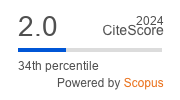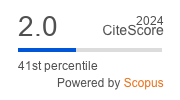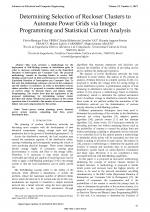| 2/2019 - 12 |
| Extra paper information in |
| Click to see author's profile in |
| Download PDF |
Author keywords
power system planning, power demand, power system analysis computing, load flow, power distribution lines
References keywords
power(18), distribution(17), systems(11), optimal(6), networks(6), energy(6), algorithm(5), system(4), smart(4), placement(4)
Blue keywords are present in both the references section and the paper title.
About this article
Date of Publication: 2019-05-31
Volume 19, Issue 2, Year 2019, On page(s): 91 - 96
ISSN: 1582-7445, e-ISSN: 1844-7600
Digital Object Identifier: 10.4316/AECE.2019.02012
Web of Science Accession Number: 000475806300012
SCOPUS ID: 85066333632
Abstract
This work presents a methodology for the deployment of Self-Healing systems in distribution grids in order to decrease continuity indexes such as the Equivalent Duration of Interruption per Consumer Unit. The proposed methodology consists in choosing feeders to receive Self-Healing system based on their performances in relation to the Equivalent Duration of Interruption per Consumer Unit. To this end, this methodology addresses current in the conductors and the number of consumers. In order to determine recloser cluster priorities, it is proposed to consider statistical analysis of current values by Decision theory and Binary Linear Programming. The results show that the application of the proposed methodology for determining recloser cluster priorities and cluster selection has great impact on the system operation since it is related to the number of served consumers, failure rates and compensation for the system. |
| References | | | Cited By «-- Click to see who has cited this paper |
| [1] P. S. Georgilakis and N. D. Hatziargyriou, "Optimal Distributed Generation Placement in Power Distribution Networks: Models, Methods, and Future Research," IEEE Transactions on Power Systems, vol. 28, no. 3, pp. 3420-3428, Aug. 2013, [CrossRef] [SCOPUS Times Cited 781] [2] M. Zidar, P. S. Georgilakis, N. D. Hatziargyriou, T. Capuder and D. Å krlec, "Review of energy storage allocation in power distribution networks: applications, methods and future research," IET Generation, Transmission & Distribution, vol. 10, no. 3, pp. 645-652, 2016, [CrossRef] [SCOPUS Times Cited 254] [3] X. Cao, H. Wang, Y. Liu, R. Azizipanah-Abarghooee and V. Terzija, "Coordinating self-healing control of bulk power transmission system based on a hierarchical top-down strategy," International Journal of Electrical Power & Energy Systems, vol. 90, pp. 147-157, 2017, [CrossRef] [SCOPUS Times Cited 23] [4] M. E. El-hawary, "The smart grid-state-of-the-art and future trends," Electric Power Components and Systems, vol. 42, no. 3-4, pp. 239-250, 2014, [CrossRef] [SCOPUS Times Cited 323] [5] C. Wang and Y. Zhang, "Fault Correspondence Analysis in Complex Electric Power Systems," Advances in Electrical and Computer Engineering, vol.15, no.1, pp.11-16, 2015, [CrossRef] [Full Text] [SCOPUS Times Cited 6] [6] G. Grigoras, G. Cartina and E. C. Bobric, "Strategies for Power/Energy Saving in Distribution Networks," Advances in Electrical and Computer Engineering, vol. 10, no. 2, pp. 61-64, 2010, [CrossRef] [Full Text] [SCOPUS Times Cited 14] [7] L. Martinovic, D. Capko and A. Erdeljan, "Load Balancing of Large Distribution Network Model Calculations," Advances in Electrical and Computer Engineering, vol. 17, no. 4, pp. 11-18, 2017, [CrossRef] [Full Text] [SCOPUS Times Cited 2] [8] D. Popovic, L. Glamocic, M. Nimrihter, M. Tanaskovic, D. Vukotic and D. Damljanovic, "Optimal automation level of medium voltage distribution network," in Proc. 18th International Conference and Exhibition on Electricity Distribution (CIRED), pp. 1-5, Turin, Italy, 2005. [9] W. Tippachon and D. Rerkpreedapong, "Multi-objective optimal placement of switches and protective devices in electric power distribution systems using ant colony optimization," Electr. Power Syst. Res., vol. 79, no. 7, pp. 1171-1178, 2009, [CrossRef] [SCOPUS Times Cited 113] [10] N. Gupta, A. Swarnkar, K. R. Niazi and R. C. Bansal, "Multi-objective reconfiguration of distribution systems using adaptive genetic algorithm in fuzzy framework," IET Gener. Transm. Distrib., vol. 4, no. 12, pp. 1288-1298, 2010, [CrossRef] [SCOPUS Times Cited 116] [11] A. Moradi and M. Fotuhi-Firuzabad, "Optimal switch placement in distribution systems using trinary particle swarm optimization algorithm," IEEE Trans. Power. Deliv., vol. 23, no. 1, pp. 271-279, 2008, [CrossRef] [SCOPUS Times Cited 215] [12] C. L. Su and J. H. Teng, "Outage costs quantification for benefit-cost analysis of distribution automation systems," Electr. Power Energy Syst., vol. 29, no. 12, pp. 767-774, 2007, [CrossRef] [SCOPUS Times Cited 29] [13] Sh. Abdi, K. Afshar, S. Ahmadi, N. Bigdeli and M. Abdi, "Optimal recloser and autosectionalizer allocation in distribution networks using IPSO-MONTE CARLO approach," International Journal of Electrical Power & Energy Systems, vol. 55, no. 1, pp. 602-611, 2014, [CrossRef] [SCOPUS Times Cited 39] [14] D. V. Kondo, C. F. M. Almeida, H. Kagan, A. P. Cunha, M. R. Gouvea, L. A. Felber, M. F. Braga, and J. A. O. Nascimento, "A methodology for reclosers allocation in distribution networks," in Proc. 2013 IEEE PES Conference on Innovative Smart Grid Technologies (ISGT Latin America), pp. 1-8, April 2013. [15] D. P. Bernardon, M. Sperandio, V. J. Garcia, L. N. Canha, A. D. R. Abaide, and E. F. B. Daza, "AHP decision-making algorithm to allocate remotely controlled switches in distribution networks," IEEE Transactions on Power Delivery, vol. 26, no. 3, pp. 1884-1892, 2011, [CrossRef] [SCOPUS Times Cited 101] [16] I. G. Sardou, M. Banejad, R. Hooshmand and A. Dastfan, "Modified shuffled frog leaping algorithm for optimal switch placement in distribution automation system using a multi-objective fuzzy approach," IET Generation, Transmission & Distribution, vol. 6, no. 6, pp. 493-502, 2012, [CrossRef] [SCOPUS Times Cited 44] [17] J. J. M. Galo, M. N. Q. Macedo, L. A. L. Almeida and A. C. C. Lima, "Criteria for smart grid deployment in brazil by applying the delphi method," Energy, vol. 70, no. 1, pp. 605-611, 2014, [CrossRef] [SCOPUS Times Cited 28] [18] Dungan, R. C., "Reference Guide: The Open Distribution System Simulator (OpenDSS)", pp. 31-129, accessed on 24 June 2018 [Online] Available: Temporary on-line reference link removed - see the PDF document [19] P. A. N. Garcia, J. L. R. Pereira, S. Carneiro, V. M. da Costa, and N. Martins, "Three-phase power flow calculations using the current injection method," IEEE Transactions on Power Systems, vol. 15, no. 2, pp. 508-514, 2000, [CrossRef] [SCOPUS Times Cited 390] [20] L. Powell. Power System Load Flow Analysis. McGraw-Hill Education, New York, New York, USA, 1st ed,. pp. 63-104, 2004. [21] A. Papoulis, S. U. Pillai. Probability, Random Variables and Stochastic Processes. McGraw-Hill Europe 4th ed., pp. 241-284, 2002. [22] F. Abramovich, C. Angelini, "Bayesian maximum a posteriori multiple testing procedure," Sankhy: The Indian Journal of Statistics, vol. 68, no. 3, pp. 436-460, 2006. [23] G. B. C. Souza, F. H. T. Vieira, C. R. Lima, G. A. de Deus Junior, M. S. de Castro, S. G. de Araujo and T. L. Vasques, "Developing smart grids based on gprs and zigbee technologies using queueing modeling based optimization algorithm," ETRI Journal, vol. 38, no. 1, pp. 41-51, 2016, [CrossRef] [SCOPUS Times Cited 13] [24] T. Ding, R. Bo, F. Li and H. Sun, "A bi-level branch and bound method for economic dispatch with disjoint prohibited zones considering network losses," IEEE Transactions on Power Systems, vol. 30, no. 6, pp. 2841-2855, 2015, [CrossRef] [SCOPUS Times Cited 84] [25] J. O. Berger. Statistical Decision Theory and Bayesian Analysis. Springer, New York, New York, USA, vol. 2, pp. 118-286, 1985. Web of Science® Citations for all references: 0 SCOPUS® Citations for all references: 2,575 TCR Web of Science® Average Citations per reference: 0 SCOPUS® Average Citations per reference: 99 ACR TCR = Total Citations for References / ACR = Average Citations per Reference We introduced in 2010 - for the first time in scientific publishing, the term "References Weight", as a quantitative indication of the quality ... Read more Citations for references updated on 2025-06-30 21:10 in 120 seconds. Note1: Web of Science® is a registered trademark of Clarivate Analytics. Note2: SCOPUS® is a registered trademark of Elsevier B.V. Disclaimer: All queries to the respective databases were made by using the DOI record of every reference (where available). Due to technical problems beyond our control, the information is not always accurate. Please use the CrossRef link to visit the respective publisher site. |
Faculty of Electrical Engineering and Computer Science
Stefan cel Mare University of Suceava, Romania
All rights reserved: Advances in Electrical and Computer Engineering is a registered trademark of the Stefan cel Mare University of Suceava. No part of this publication may be reproduced, stored in a retrieval system, photocopied, recorded or archived, without the written permission from the Editor. When authors submit their papers for publication, they agree that the copyright for their article be transferred to the Faculty of Electrical Engineering and Computer Science, Stefan cel Mare University of Suceava, Romania, if and only if the articles are accepted for publication. The copyright covers the exclusive rights to reproduce and distribute the article, including reprints and translations.
Permission for other use: The copyright owner's consent does not extend to copying for general distribution, for promotion, for creating new works, or for resale. Specific written permission must be obtained from the Editor for such copying. Direct linking to files hosted on this website is strictly prohibited.
Disclaimer: Whilst every effort is made by the publishers and editorial board to see that no inaccurate or misleading data, opinions or statements appear in this journal, they wish to make it clear that all information and opinions formulated in the articles, as well as linguistic accuracy, are the sole responsibility of the author.



